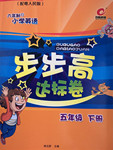题目内容
The ballet dancer’s confidence built up ________ as she gained more and more experience on the stage.
A. mostly B. generally
C. sharply D. gradually
 步步高达标卷系列答案
步步高达标卷系列答案Music is a Universal Language
“Music is the universal language of mankind.” – Henry Longfellow
Everyone has the inborn ability to understand and enjoy music. There are many theories as to why this is, but it has become a part of human beings. Since the beginning, humans have expressed themselves through music. Simple tribal rhythms evolved into many types of more complex music, including classical, rock, jazz, and R&B. While the styles between these many types of music may vary, everyone is able to understand and relate to them.
What are the essential parts of a language? Every language uses vocabulary, or a set of words, to create sentences that convey messages. The tone and style of the sentences convey different feelings or emotions. Music is exactly the same way. Twelve tones, or notes, are combined to create phrases that also convey emotion. Music can even be written, like most other languages. Conversations even take place in music. Two saxophonists can play melodies back and forth, expressing different styles and feelings, building off of each other, responding to each other. Music changes over the years like other languages. Most people who speak fluent English cannot read one of Shakespeare’s plays because the language has changed so much. Music is also affected by time, and over a long period, many new types of music and instruments have emerged to create different sounds and convey different messages. There are so many similarities between vocal language and music that they must be same.
I recently had a chance to experience conversation through music. In 2008, I traveled to Manila, Philippines to participate in a high school jazz exchange where many students from all over Asia came together to share their talents. Everyone was mixed into different small groups to prepare for a concert at the end of week. Few people spoke fluent English so vocal communication was very tough. However, it wasn’t needed. Everyone seemed to understand each other simply through the music and there were few times where direct translation was needed. At the performance, every group played for a live audience. They all sounded phenomenal and it felt like they were in perfect time and harmony. During my group’s performance, I was able to improvise with a Korean boy who spoke very little English. But we managed to have a conversation through our instruments, building off each other’s riffs until we were creating our own melody on the fly. It was a great experience.
Because of the many similarities that music shares with other languages, it is a very effective way to communicate with others. Music brings us together, connects us with other people, and allows us to express ourselves in ways that are different from speech and writing. It has the ability to convey emotions and messages to the core of people, which is why Henry Longfellow is absolutely correct when he states that “music is the universal language of mankind.”
Music is a Universal Language
Introduction | ● Human beings have the ability to appreciate music since they were 1.. ● Despite the different types2. from simple tribal rhythms, everyone is able to understand music. |
3. between language and music | ● The tone and style of the sentences convey different feelings or emotions, 4. does music. ● Like most other languages, music even has its 5. forms. ● Both language and music have gone 6. many changes over the years. ● Conversations even take place in music. ● Time also has a great 7. on music. New forms of music and instruments come up to convey different messages. |
My chance of 8. conversation through music | I participated in a high school jazz exchange in Philippines in 2008, where students came from all over Asia. While there were language 9. between us, we still managed to communicate well by music. |
Conclusion | Music is a very effective way to communicate with others. Just as Henry Longfellow 10. it, “music is the universal language of mankind.” |

